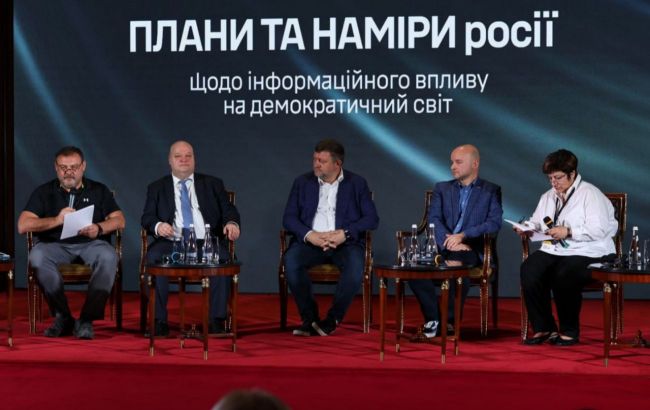Russia spends $2 billion on propaganda in 2025 — Ex-head of Ukrainian intelligence
 Photo: Former head of the Defence Intelligence and Foreign Intelligence Service of Ukraine Valeriy Kondratiuk (DIU)
Photo: Former head of the Defence Intelligence and Foreign Intelligence Service of Ukraine Valeriy Kondratiuk (DIU)
Russia's 2025 propaganda budget totaled two billion dollars. This is even more than the aggressor country spent last year, Valeriy Kondratiuk, the officer, former head of the Defence Intelligence and Foreign Intelligence Service of Ukraine, during the International Forum Information War: from Resistance to Resilience, organized by the Defence Intelligence of the Ministry of Defence of Ukraine and the Institute of National Resilience and Security.
New trends in Russian information attacks
"Why do Russian lies spread faster than the truth? Because truth does not have such a Russian budget," noted Valeriy Kondratiuk.
The former head of the Defence Intelligence during his speech named the trends that appeared in the Russian machine of disinformation precisely in 2024–25 and that were massively used in Russian information attacks. This is what experts worldwide have noted.
"First — the use of artificial intelligence to create texts in different languages. Synthetic videos and audio are created with the imitation of the voices of politicians, automated creation of tens of thousands of realistic accounts. In 2024, a network was detected that spread artificially generated texts in social networks in the European Union," he said.
The second is information campaigns with messages. In Telegram, in YouTube, in X and even in gaming chats.
"This creates the effect of polyphony, when one message is spread in dozens of different independent sources," the specialist explains.
The next trend — localization of disinformation. When messages are adjusted to local content, for example:
-
In Hungary – about refugees,
-
In Germany — about energy,
-
In the USA — about Ukraine.
For this, according to Kondratiuk, local media, journalists, and politicians are involved.
"Another one is cyber and information attacks. After data breaches, information campaigns are immediately launched, when this data was instantly published by various sites," noted Valeriy Kondratiuk.
Another — manipulation of social media algorithms. When the Kremlin uses a bot farm with geolocation to promote messages in specific countries to create the illusion of mass support.
"All this not only misleads but also forms the feeling that now we cannot trust anyone. This undermines public trust in democracy from the inside," he explained.
How to counter such enemy attacks?
"If to generalize, I would include here regulatory policy and cooperation with platforms. It is necessary to develop a standard of transparency for political advertising. Joint databases of bot networks. To provide platforms with quick labeling and removal of an information campaign within 48–24 hours," said Kondratiuk.
In addition, he believes that it is necessary to:
-
strengthen the protection of election infrastructure,
-
regularly conduct training and cooperation with journalists,
-
integrate Ukraine into the joint information alliance of the EU and NATO.
Among other things, it is necessary to form social resilience to information attacks — media literacy programs in schools, universities, in different groups will help. Information for military, pensioners, and displaced persons.
At the same time, in the speaker's opinion, it is worth supporting independent mass media and fact-checking initiatives.
It is worth noting that the Forum Information War: From Resistance to Resilience brought together experts from various countries, who, in an interdisciplinary format, discussed ways of creating effective mechanisms for informational and cognitive security.
The Forum became a space for exchanging experiences in countering modern threats and for developing joint international strategies to strengthen resilience.
It is worth noting that already last year, it became known that Russia uses artificial intelligence to strengthen disinformation campaigns against Ukraine. This is the latest priority of its propaganda centers.
Moreover, Russian propagandists, with the help of artificial intelligence, even create dozens of different pseudo TV plots allegedly from Ukrainian TV channels and spread them in social networks.

